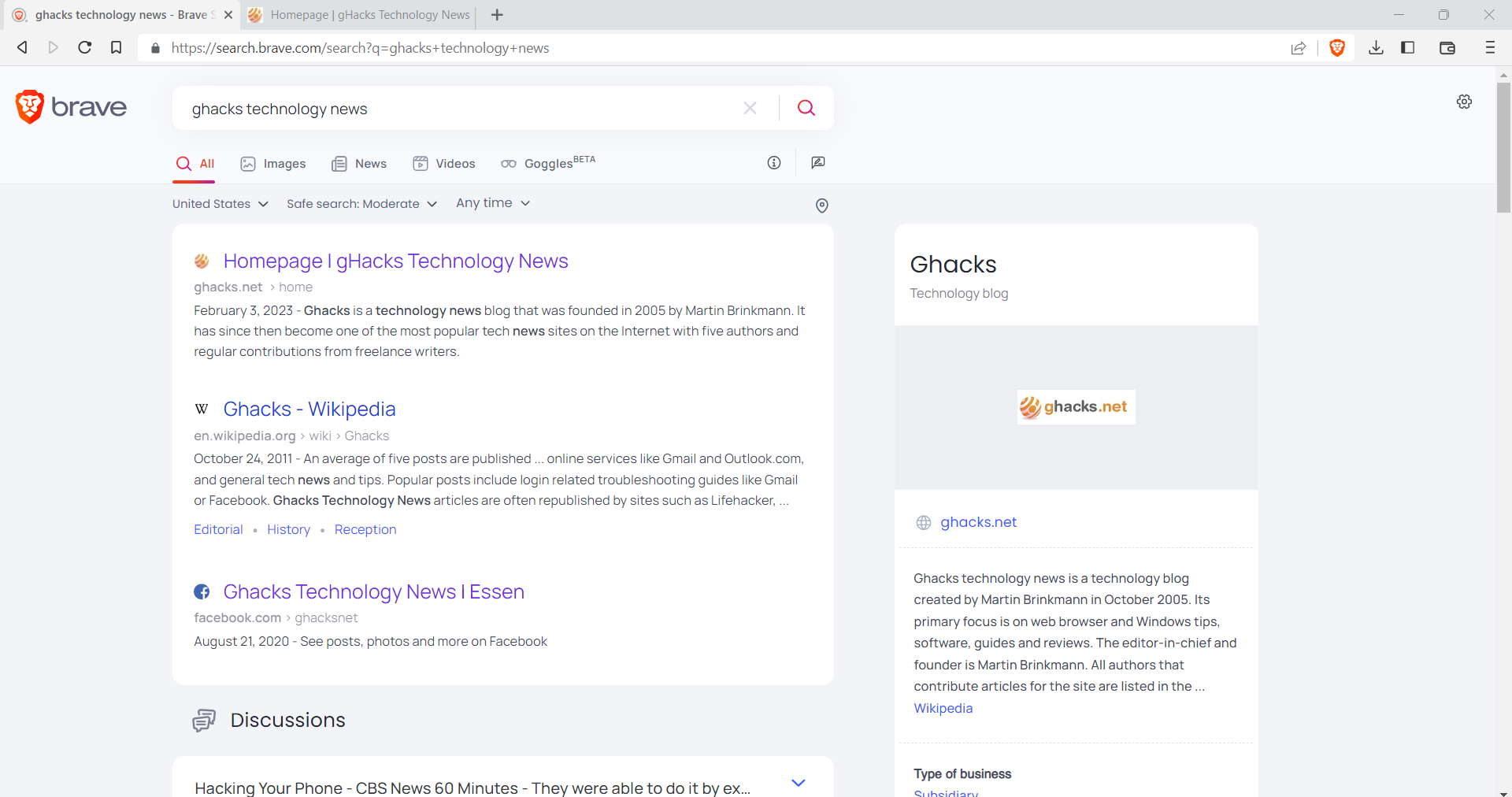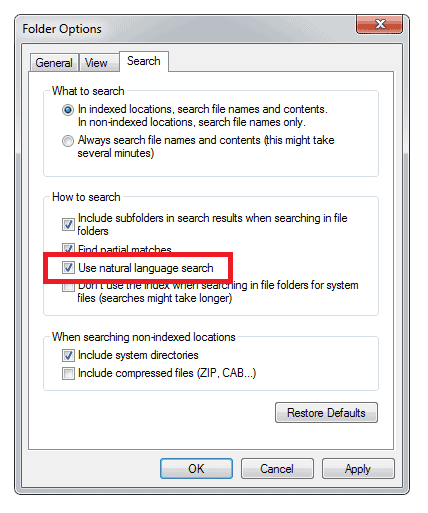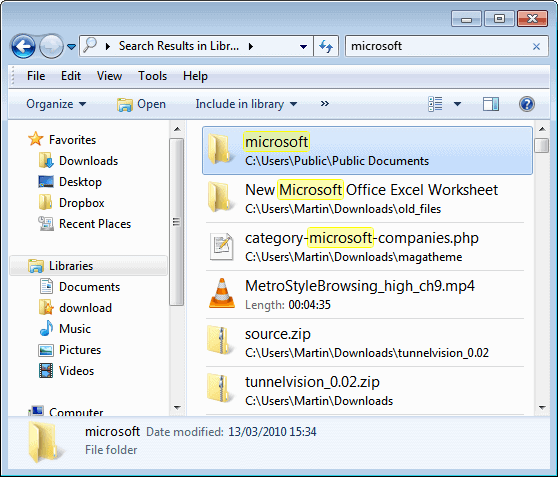Brave Search reaches full independence

Brave Software announced that its search engine Brave Search has reached full independence of other search engines.
Brave Search's journey began in 2021 with the acquisition of Tailcat's search engine and development team. Brave Software planned to evolve it into a fully independent search engine that would not rely on content provided by Microsoft's Bing Search or Google's Google Search engine.
Brave Search Beta launched in June 2021 and Brave Software started to make it the default search engine in its browser Brave a few months later.
Several new features were added to Brave Search ever since. The company added Discussions to search results, to add "real-human conversations" to Brave Search. Brave Search Goggles was designed to boost or downrank sites to customize results, and Brave Search Summarizer added AI-powered quick results to the search engine.
Brave Search reached a milestone this week. All results provided by the search engine come from its own index now. About 7% of queries came from Bing Search until recently, but all connections to the Bing API have been cut according to the announcement.

The improvement was achieved through rapid growth and "broad adoption of the Web Discovery Project". Brave Search averages 22 million queries per day, according to Brave Software. The Web Discovery Project allows users to contribute browsing data anonymously to grow the index of the search engine.
Brave Software admits that uncertainty regarding Bing's API access were a major concern and driving factor in becoming fully independent. Microsoft did increase Bing API pricing recently, in some cases by up to 1000%.
All search results on Brave Search are now powered by the search engine's own index. The Google Fallback option remains available for the time being. It was introduced to give Brave Search users an option if the returned results did not provide the answers or information the user was looking for.
Full independence gives Brave Software full control over its search engine, and it reduces costs for the company, as calls to Bing's API do not have to be made anymore.
Brave Software plans to launch an API soon, the Brave Search API, which gives access to the API to developers and companies. Brave Software did not reveal information on pricing at this point or whether there will be a free option available.
Internet users have now another fully independent search option at their disposal.
Now You: have you tried Brave Search?





















The one thing I dislike with ‘Brave Search’ is that if doesn’t include all of the user’s preferences in cookies, sending two of them to the user’s LocalStorage : ‘Discussions’ and ‘Anonymous usage metrics’. Why? This means that if you grant cookie permission for [search.brave.com] your localStorage will not only be filled with your preferences for ‘Discussions’ and ‘Anonymous usage metrics’ but as well with superfluous IndexedDB data (unless to use an extension such as ‘Cookie Autodelete’ and set it to keep only cookies and LocalStorage for [search.brave.com]).
Generally speaking LocalStorage is not to include what is notoriously, obviously a cookie’s prerogative. Some other sites do it as well, others such as the ‘Qwant’ search engine no longer do and that’s a plus IMO.
Personally I decided not to grant cookie permission (use ‘default’ not ‘allowed’) for [search.brave.com] which means cookies/LocalStorage are session only. To have all my settings auto-generate when opening Brave Search I’ve built a simple script and share it for those who might be interested (requires of course a userscript manager such as ‘Violent Monkey’) : [https://filebin.net/4qqlsecdzgxsodvz/Cookie_for_search.brave.com.js]
I’ve set ‘Bing’ as the image and video search options and because i use neither Bing not google i’ve added a dedicated redirection to my Firefox ‘REDIRECT’ extension to redirect Brave images/videos Search redirects to DuckDuckGo images and videos. Et voila : a nice search engine, tailored.
The script sets my preferences, of course edit it for yours.
This Brave index was built by collecting from the users
“search queries, search result clicks, the URLs of pages visited in the browser, time spent on those pages, and some metadata about the pages themselves.”
https://support.brave.com/hc/en-us/articles/4409406835469-What-is-the-Web-Discovery-Project-
Talk about an “alternative” to the data sucking giants. They even hired the Cliqz/Ghostery squad that caused a privacy scandal by doing almost exactly the same thing back then in Firefox. Well at least this time they claim it was opt-in. But I wonder why anyone would. Even those who don’t understand privacy should realize that on another topic, they are then doing charitable (data) donations to a for-profit. I heard that this has become a thing in the IT field even with actual money donations, other for-profits like SwissCows and the new one behind Thunderbird are doing it too, but to me it’s like they found yet another creative way to manipulate and spit on their users, as is especially common in that field.
Independent you say? Interesting, as I see that they are doing heavy filtering of the content and propagating current agenda. No independent at all, so what’s the point of moving from Google, Bing, Duck duck go or any other?
Let see,
Personal attacks? Check
Text wall? Check
Denial of Brave’s very clear links to Big Tech? Check
Over use of following words: LMAO, LOL, shill? Fail
Ranting about Firefox conspiracy theories? Fail
Score 3/5
Seems like gHacks article covers all necessary information for people to still say dumb comments like “what about images and videos”
I am sorry to say it like this but are humans, gHacks readers in this case, so dumb they can’t even read the article and then use the brain to process the information and understand it?
Brave WAS using Bing API for images, videos and news and some normal queries.
Brave decided to stop using Bing API and go full Brave indexer now.
The reasons are simple, Bing API became more costly, probably because Microsoft has spent billions building their Bing Chat AI, and they want somehow to make some money back.
Yes, it is NOT free to use Bing API. DuckDuckGo, Qwant, Ecosia, Swisscows… most search engines pay Microsoft and give data to Microsoft, you can read it in their privacy policies.
Brave can’t deliver images or video, so they have to redirect people to Bing or Google, because Search Engine field besides Yandex, couple Chinese search engines Mojeek and Gigablast, is controlled by Google mostly and then Bing/Bing API search engines.
Brave is pretty much doing automatically what users have to do manually, you know, switch browsers to search for images and videos, use !bangs or add a custom search engine for some images and video services and then use the omnibox to search for those things.
There is no other way around than a temporary redirection or manually using other search engines, which like I said, you will probably end up using Bing API unless you use Yandex which is the only decent alternative for images and videos.
It’s just dumb to complain about it at this point, Brave even said they would release a Brave Search API for companies to use it, maybe take away some of the power Bing has by so many search engines that promote privacy using Bing API.
Some day Brave indexer will offer images and videos, for now, removing Bing API is the best they can do.
There was no reason for Brave to pay Bing API and waste money on it, because Bing is not even a good indexer, not talking about all the censorship and bias views they have, but it simply isn’t that great for images and videos.
So offering an automatic redirection is just to make things easier but doesn’t mean people need to use it. Again, Unless you use Yandex, there are not even alternatives to Google and Bing when it comes to images and videos, so complaining about it is silly.
Then nothing is stopping you from using Yandex.
Bing API in Brave was a terrible idea form day one, at least they are moving forward, unlike most search engines, DDG, Ecosia, Qwant and Swisscows, that will keep paying for Bing API and keep sharing data with Microsoft.
@Slot Machine, you are definitely right. I figured it out after having written a comment above worth being qualified of “dumb” because indeed I hadn’t correlated facts to explanations provided in the article. I had then in mind of correcting my comment, forgot to do so, and I now bounce on your comment to do so. There’s dumber than dumb : not recognizing a mistake.
As far as Brave Image and Video Search is concerned the approach I’ve chosen is to consider Bing as provider of both and then redirect both from Bing to DuckDuckGo via the ‘Redirector’ extension. I avoid both Bing and Google.
No one gives a fuck about what’s the behind of the scene of Brave, understand ? That’s why they ask what they see, in front of them.
Don’t need to be so salty, people have more important things to do like teaching their kids, making money, why researching about a whatever search engine, that’s the job of researchers, new writters, not merely people.
Not a brave movement itself.
Not sure how its independent when Brave Search for Images/videos asks to choose between Google and Bing as the provider before it will give results.
Its a start. Maybe eventually they will have their own.
I think that’s a wise move by Brave.
Microsoft have an abysmal record when it comes to abusing their position and throwing others under the bus. It was only a matter of time before Microsoft decided to start turning the screws on the third-party search engines using the Bing backend. It wouldn’t surprise me if Microsoft’s plan all along was to allow third-party search engines access to their Bing API in order to buy some time and collect data for Bing, but ultimately their aim was to eventually get rid of any search engine competition and create a search duopoly with Google. All they need to do is keep increasing the API pricing so third-party search engines can’t afford it anymore – or even decide to shut it off altogether.
Even after all these years, Microsoft’s “Embrace, Extend, Extinguish” monopolistic philophosy is always lurking still.
Brave need to do something about directing their users to Google or Bing websites for image and video searches though. The whole idea of a privacy-orientated search engine is not to use Google or Bing.
I’m surprised an economic superpower like Europe hasn’t followed Russia and China and created their own independent search engine yet.
Mojeek is another independent search engine with its own bot, and it is based in Europe.
@ECJ, a wise move together together with a less wise one : as I mentioned above I had created two smart keywords for Brave Search Images and for Brave Search Videos, and if I had done so it was because at the time Brave Search did not redirect their Images Search nor their Videos Search to Bing or Google (user’s choice) as I’ve just discovered it after reading this article, and which occurred between my last Images/Videos search on Brave Search and now.
Here is Brave’s notification regarding its Images and Videos search :
“ndependent Search
Brave search now relies 100% on its own index.
Video and images verticals are something that we cannot yet do without relying on a 3rd party, such as Bing API. Rather than calling an external service, we opted for a simple redirect to your preferred choice.
Provenance of the results is transparent. For videos and images you choose your provider. All the rest is 100% Brave search.
Removes a business dependency to Microsoft Bing.
Last and not least, privacy is covered via Brave Browser with built-in tracking protection.
Rest assured the team is working on improving on Videos and Images search capabilities.”
— I’ll wait for Brave Image and Video Search to be improved or, rather, to be independent again, because this redirection to Bing/Google is NEW.
Brave Search for Images/videos asks to choose between Google and Bing as the provider, which didn’t happen before (last time I searched for either, some time ago).
What full Brave Search independence? I had 2 smart keywords for Brave Search Images and Brave Search Videos which I now remove consequently.
What about image searches? It directly sends you either to Bing or Google.
—
And, just in case, add these to uBo:
||search.anonymous.ads.brave.com^
||search.brave.com/serp/v1/static/serp-js/telemetry/
||search.brave.com###usage-metrics-notice
[ https://i.postimg.cc/SNZdbv51/jjjjjjjjjjjjjjjjjjjjj.png ]
?!
Invalid filter?!
µBlock origin v.1.49.2
The correct syntax would be:
||search.anonymous.ads.brave.com^
||search.brave.com/serp/v1/static/serp-js/telemetry/
search.brave.com###usage-metrics-notice
Explanation:
|| is used to block domains/paths, while ### is used to block element IDs. A combination of both will not work and will result in an error (‘Invalid filter: Bad domain name’).
What are those 3 lines doing?
brave is an advertising company backed by venture capitalists
as per usual, they just use other companies hard work and then spin it for all it’s worth – so not only are they an advertising company, but they’re cheap and unoriginal
If added to the ‘uBlock Origin’ browser extension those 3 lines prevent Brave Search from connecting to what they hold. Those 3 lines are pertinent on the ground they’re not already included in either of uBO’s filter lists — which is why @Cor Invictus stated “just in case” –, lists which are at the discretion of the user whom is entitled to disable a native uBO filter/filter list and add any of his own filter/filter list. This may not be understandable for users who haven’t adopted uBO.